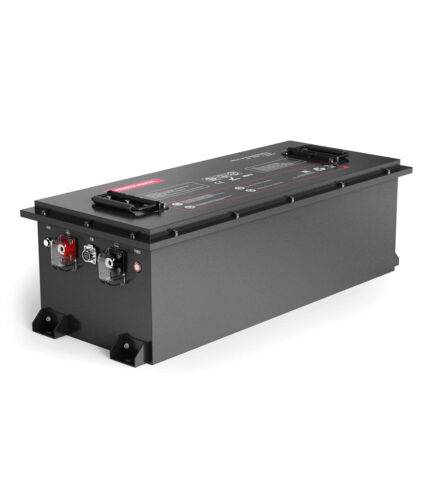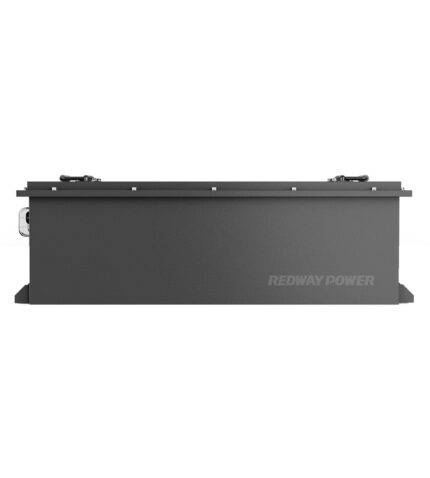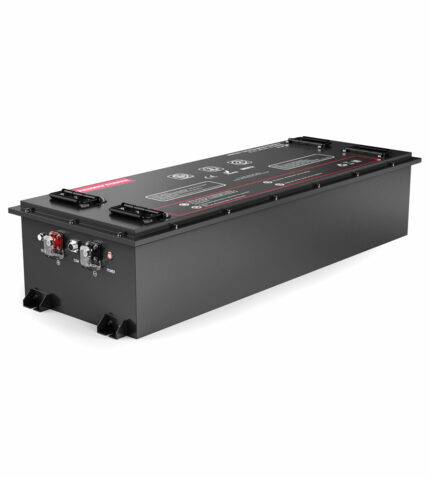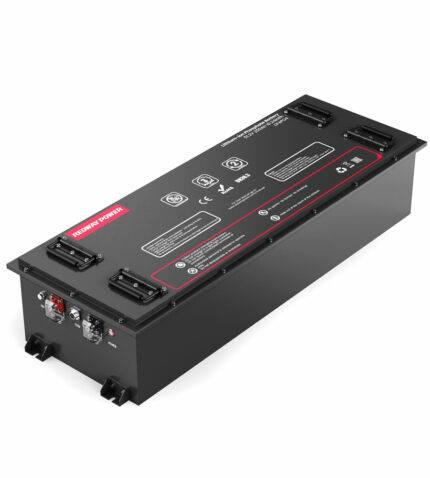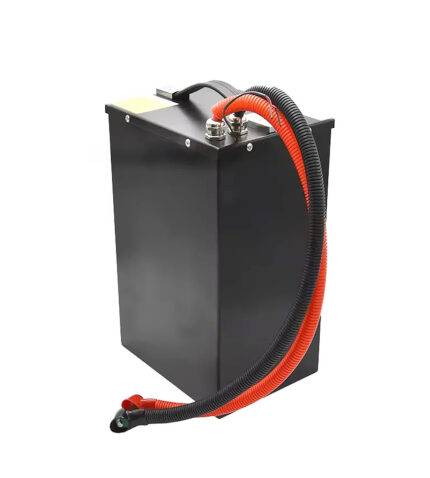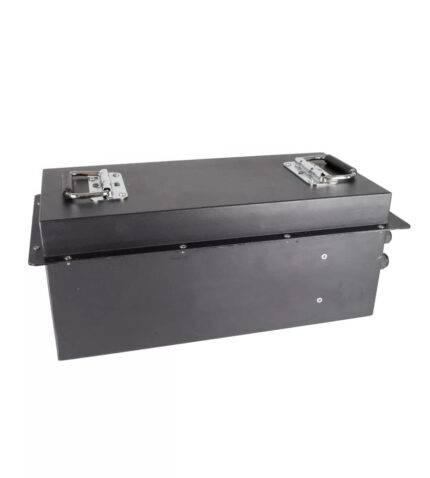- Forklift Lithium Battery
-
48V
- 48V 210Ah
- 48V 300Ah
- 48V 420Ah (949 x 349 x 569 mm)
- 48V 420Ah (950 x 421 x 450 mm)
- 48V 456Ah
- 48V 460Ah (830 x 630 x 590 mm)
- 48V 460Ah (950 x 421 x 450 mm)
- 48V 460Ah (800 x 630 x 600 mm)
- 48V 460Ah (820 x 660 x 470 mm)
- 48V 500Ah
- 48V 560Ah (810 x 630 x 600 mm)
- 48V 560Ah (950 x 592 x 450 mm)
- 48V 600Ah
- 48V 630Ah
-
48V
- Lithium Golf Cart Battery
- 12V Lithium Battery
12V 150Ah Lithium RV Battery
Bluetooth App | BCI Group 31
LiFePO4 Lithium
Discharge Temperature -20°C ~ 65°C
Fast Charger 14.6V 50A
Solar MPPT Charging - 24V Lithium Battery
- 36V Lithium Battery
- 48V Lithium Battery
-
48V LiFePO4 Battery
- 48V 50Ah
- 48V 50Ah (for Golf Carts)
- 48V 60Ah (8D)
- 48V 100Ah (8D)
- 48V 100Ah
- 48V 100Ah (Discharge 100A for Golf Carts)
- 48V 100Ah (Discharge 150A for Golf Carts)
- 48V 100Ah (Discharge 200A for Golf Carts)
- 48V 150Ah (for Golf Carts)
- 48V 160Ah (Discharge 100A for Golf Carts)
- 48V 160Ah (Discharge 160A for Golf Carts)
-
48V LiFePO4 Battery
- 60V Lithium Battery
-
60V LiFePO4 Battery
- 60V 20Ah
- 60V 30Ah
- 60V 50Ah
- 60V 50Ah (Small Size / Side Terminal)
- 60V 100Ah (for Electric Motocycle, Electric Scooter, LSV, AGV)
- 60V 100Ah (for Forklift, AGV, Electric Scooter, Sweeper)
- 60V 150Ah (E-Motocycle / E-Scooter / E-Tricycle / Tour LSV)
- 60V 200Ah (for Forklift, AGV, Electric Scooter, Sweeper)
-
60V LiFePO4 Battery
- 72V~96V Lithium Battery
- Rack-mounted Lithium Battery
- E-Bike Battery
- All-in-One Home-ESS
- Wall-mount Battery ESS
-
Home-ESS Lithium Battery PowerWall
- 24V 100Ah 2.4kWh PW24100-S PowerWall
- 48V 50Ah 2.4kWh PW4850-S PowerWall
- 48V 50Ah 2.56kWh PW5150-S PowerWall
- 48V 100Ah 5.12kWh PW51100-F PowerWall (IP65)
- 48V 100Ah 5.12kWh PW51100-S PowerWall
- 48V 100Ah 5.12kWh PW51100-H PowerWall
- 48V 200Ah 10kWh PW51200-H PowerWall
- 48V 300Ah 15kWh PW51300-H PowerWall
PowerWall 51.2V 100Ah LiFePO4 Lithium Battery
Highly popular in Asia and Eastern Europe.
CE Certification | Home-ESS -
Home-ESS Lithium Battery PowerWall
- Portable Power Stations
- Forklift Lithium Battery
- Lithium Golf Cart Battery
- Rack-mounted Lithium Battery
- 12V Lithium Battery
- 24V Lithium Battery
- 36V Lithium Battery
- 48V Lithium Battery
- 60V Lithium Battery
- 72V Lithium Battery
- 96V Lithium Battery
- 21700
- C&I ESS
- eBike Lithium Battery
- All-in-One Home ESS
- PowerWall HESS
- Car Starter Lithium Battery
- Portable Power Station
- Other
- Best Seller 2024
Redway Power is a distinguished manufacturer wholesaler, specializing in premium 72V LiFePO4 lithium batteries (for Electric Scooter, Electric-Rickshaw, Electric-Trishaw, Golf Carts, Sightseeing Car, Club Car, LSV Car, EZGO, TOYOTA Electric Forklift, AGV, AMR, Towing Tractor Truck, Electric Pallet Truck, Solar ESS, etc). Renowned for reliability and performance, their batteries meet diverse industrial demands. With a focus on wholesale distribution, Redway Power provides efficient and sustainable power storage solutions, ensuring customer satisfaction and industry-leading standards.
Showing all 10 results
72V Lithium Battery FAQs▾
What is the range of a 72V battery?
The range of a 72V battery typically depends on the application and capacity. For electric vehicles, a 72V battery can provide a range of approximately 30 to 50 miles on a full charge, depending on factors like load, terrain, and driving speed.
How many cells does it take to make a 72V battery?
To create a 72V lithium battery, you typically need 20 cells connected in series if using standard 3.6V lithium-ion cells. This configuration achieves the desired voltage output for applications like electric vehicles.
What is the difference between 48V and 72V?
The primary difference between 48V and 72V batteries is their voltage output. A 72V battery generally provides more power and better performance for high-demand applications compared to a 48V battery, which is commonly used in standard electric vehicles.
What are the disadvantages of lithium golf cart batteries?
Disadvantages of lithium golf cart batteries include higher upfront costs compared to lead-acid batteries, sensitivity to extreme temperatures, and the need for specialized chargers. Additionally, they may require monitoring systems for optimal performance.
How much does it cost to convert a golf cart to lithium batteries?
Converting a golf cart to lithium batteries typically costs between $1,500 and $3,500. This price includes the lithium battery pack and any necessary modifications to the electrical system for compatibility with lithium technology.
Can I charge a 72V battery with a 60V charger?
No, you cannot charge a 72V battery with a 60V charger. The charger will not provide sufficient voltage to fully charge the battery, leading to incomplete charging and reduced performance.
What is the full charge of a 72V lithium battery?
A fully charged 72V lithium battery typically reaches about 84V, corresponding to the maximum voltage of its individual cells when fully charged. This ensures optimal performance during operation.
How long does it take to charge a 72 volt golf cart?
Charging a 72-volt golf cart usually takes about 8 to 12 hours, depending on the charger's output current and the state of charge of the battery. Using an appropriate charger designed for lithium technology can optimize charging time.
Is it worth switching to lithium golf cart batteries?
Yes, switching to lithium golf cart batteries is often worth it due to benefits like longer lifespan, faster charging times, reduced weight, and improved performance. While initial costs are higher, long-term savings in maintenance make it an attractive option.
What is the best voltage for electric golf carts?
The best voltage for electric golf carts typically ranges from 36V to 72V, depending on the application and desired performance. Higher voltages generally provide better acceleration and efficiency for larger or more powerful carts.
What is the lifespan of a lithium battery?
A lithium battery typically has a lifespan of around 10 to 15 years, depending on usage patterns and maintenance practices. Proper care can significantly extend its lifespan compared to other types of batteries.
Which type of lithium battery will last the longest?
The type of lithium battery that lasts the longest is usually the lithium iron phosphate (LiFePO4) battery. These batteries can endure thousands of charge cycles while maintaining high capacity and safety under various conditions.
What shortens the life of lithium batteries?
Factors that shorten the life of lithium batteries include extreme temperatures (both hot and cold), frequent deep discharges, overcharging, and using incompatible chargers. Proper care and following manufacturer guidelines help maximize their lifespan.
What is the range of a 72V 30Ah lithium battery?
A 72V 30Ah lithium battery can provide an approximate range of 30 to 50 miles, depending on factors like vehicle efficiency, load weight, terrain, and driving speed. Actual range may vary based on these conditions.
How do you calculate how long a lithium battery will last?
To calculate how long a lithium battery will last, divide its capacity (in Ah) by the load (in A). For example, if you have a 100Ah battery powering a device that draws 10A, it will last approximately 10010=1010100=10 hours.
What is the difference between 48V and 72V?
The difference between 48V and 72V batteries lies in their voltage output; a higher voltage generally allows for better performance in high-demand applications. A 72V system can provide more power than a 48V system, making it suitable for larger or faster vehicles.
Is it okay to leave a lithium-ion battery on the charger overnight?
Yes, it is generally safe to leave a lithium-ion battery on the charger overnight. Most modern chargers have built-in protections that prevent overcharging. However, it's best practice to use chargers specifically designed for lithium technology.
What happens if you charge a lithium battery with a normal charger?
Charging a lithium battery with a normal charger can lead to overcharging or overheating since normal chargers do not provide the specific charging profile required for lithium batteries. This can result in reduced lifespan or even safety hazards.
Can I use a regular trickle charger on a lithium battery?
No, using a regular trickle charger on a lithium battery is not recommended. Lithium batteries require chargers designed specifically for their chemistry that manage voltage and current appropriately during charging cycles for safety and efficiency.
Are lithium batteries worth it for golf carts?
Yes, lithium batteries are often worth it for golf carts due to their longer lifespan, faster charging times, lighter weight, and improved performance compared to lead-acid batteries. While they have higher upfront costs, they offer significant long-term savings in maintenance and replacement.
Is the OEM 72V battery the same as the original?
The term ‘OEM’ in the context of a 72V battery stands for Original Equipment Manufacturer. It means that the battery is produced by the same company that manufactured the device, ensuring compatibility and reliability. While an OEM battery aims to closely match the original battery in terms of performance, it is crucial to verify compatibility and quality. Choosing an OEM battery can provide peace of mind through its seamless compatibility and adherence to the manufacturer’s specifications.
How long can a 72V lithium battery last?
The lifespan of a 72V lithium battery depends on factors such as battery chemistry, usage patterns, and maintenance. Typically, LiFePO4 batteries, commonly used in 72V applications, last around 2000 to 3000 charge-discharge cycles, which translates to approximately 5.5 years with daily use. However, the actual lifespan may vary based on individual usage and environmental factors. Regular monitoring, proper maintenance, and following recommended charging practices are essential for maximizing the battery’s lifespan and performance.
How many solar panels do I need for a 200Ah battery?
The number of solar panels needed to charge a 200Ah battery depends on factors such as the energy stored in the battery, the power generated by each watt of solar panels, and the safe charging voltage. Calculations can be made based on these factors to determine the optimal number of solar panels required. For a 12V, 200Ah battery, approximately 13 solar panels may be needed. It is important to consider factors such as energy usage, sunlight availability, and panel efficiency when determining the number of solar panels needed.
How can you maximize the life of a LiFePO4 battery?
LiFePO4 (lithium iron phosphate) batteries are known for their exceptional durability and long cycle life. To maximize the lifespan of these batteries, it is essential to implement proper usage, maintenance, and charging practices. Here are some effective strategies for optimizing the life of LiFePO4 batteries:
- Proper Charging Practices: Avoid overcharging the battery by using chargers equipped with automatic shut-off features or carefully monitoring the charging process. Adhere to the manufacturer’s recommended charging voltage.
- Temperature Management: Maintain an appropriate operating temperature range for the battery. Avoid exposure to extreme heat or cold, as it can impact performance and longevity.
- Depth of Discharge (DoD): Minimize deep discharges by avoiding fully draining the battery whenever possible. Keeping the battery level above 20% can help prolong its lifespan.
- Regular Maintenance: Perform routine inspections and cleaning of the battery terminals and connections. Address any signs of damage or corrosion promptly.
By following these strategies, you can enhance the performance and longevity of your LiFePO4 battery, maximizing its value and reliability for various applications.”
What is the maximum charge voltage for a 72V LiFePO4 battery?
The maximum charge voltage for a 72V LiFePO4 battery is typically around 88.8 volts, which corresponds to 3.7 volts per cell group. This calculation is based on the nominal voltage of LiFePO4 cells, which is 3.2 volts. It is important to note that the actual voltage may vary slightly depending on the specific battery model and manufacturer. Proper charging practices and following the manufacturer’s recommendations are essential for ensuring the longevity and performance of the LiFePO4 battery.
Is it OK to fully discharge a 72V LiFePO4 battery?
Fully discharging a LiFePO4 battery is not recommended as it can have detrimental effects on its lifespan and performance. Completely draining the battery can cause irreversible damage to its cells, reduce its overall capacity, and even lead to safety hazards such as thermal runaway. To optimize the longevity and performance of a 72V LiFePO4 battery, it is crucial to follow best discharge practices, such as avoiding deep discharges and utilizing battery management systems. By adhering to these practices, you can ensure the safety and efficiency of your LiFePO4 battery.
Should you charge a 72V LiFePO4 battery to 100%?
While charging a LiFePO4 battery to 100% can provide maximum available energy, it can also impact its lifespan and stability. It is generally recommended to charge LiFePO4 batteries to around 80% to 90% for daily use to balance energy needs and battery longevity. By considering specific requirements, such as energy demands and long-term usage, and following manufacturer guidelines, you can optimize the performance and lifespan of your 72V LiFePO4 battery.
Know more:
What are the advantages of using a 72 volt lithium battery in electric vehicles?
A 72 volt lithium battery in electric vehicles offers high energy density, allowing for longer ranges and faster acceleration. It also has a longer lifespan (up to 10 years), quicker charging times (1-2 hours), and is significantly lighter than lead-acid alternatives, enhancing overall vehicle performance and efficiency.
How does a 72v battery compare to other voltage options for energy storage?
A 72v battery provides higher power output and efficiency compared to lower voltage options like 48v or 60v batteries. This results in better acceleration, increased range, and improved performance in electric vehicles, making it suitable for demanding applications where power and efficiency are critical.
What should I consider when purchasing 72v lithium golf cart batteries?
When purchasing 72v lithium golf cart batteries, consider capacity (Ah rating), weight, compatibility with your cart, cycle life, charging time, and safety features. Look for reputable brands that offer warranties and ensure the battery can handle deep cycling for optimal performance.
What applications are suitable for a 72v 20ah lithium battery?
A 72v 20ah lithium battery is suitable for applications such as electric golf carts, e-bikes, scooters, and small electric vehicles. Its compact size and lightweight design make it ideal for portable devices requiring reliable power without excessive weight.
What are the key features of a 72v lithium battery?
Key features of a 72v lithium battery include high energy density, lightweight design, fast charging capabilities, long cycle life (up to 5,000 cycles), and built-in Battery Management Systems (BMS) for safety. These attributes enhance performance in electric vehicles and renewable energy systems.
How does a 72v lithium ion battery perform in high-drain applications?
In high-drain applications, a 72v lithium ion battery excels by providing consistent power output without significant voltage drops. This reliability makes it ideal for electric vehicles and other demanding systems that require sustained energy delivery during operation.
What components are typically included in a battery pack 72v?
A typical 72v battery pack includes multiple lithium cells connected in series to achieve the desired voltage, a Battery Management System (BMS) for monitoring and safety, connectors for integration with devices, and thermal management components to ensure safe operation under varying conditions.
What is the capacity and typical use case for a 72v 100ah lithium battery pack?
A 72v 100ah lithium battery pack provides substantial capacity suitable for applications like electric vehicles, solar energy storage systems, and industrial equipment. It can deliver significant power over extended periods, making it ideal for both recreational and commercial uses.
How do you properly maintain a 72v battery pack for longevity?
To maintain a 72v battery pack for longevity, regularly check connections for corrosion or damage, keep the battery clean and dry, avoid deep discharging below recommended levels, store at moderate temperatures when not in use, and use a compatible charger designed specifically for lithium batteries.
What are the benefits of using a 72v lifepo4 battery over other types?
The benefits of using a 72v LiFePO4 battery include enhanced safety due to thermal stability, longer cycle life (up to 5,000 cycles), better performance at high temperatures, lower self-discharge rates, and environmental friendliness compared to other lithium chemistries.
Can you explain the technology behind a 72v amorge battery?
The technology behind a 72v Amorge battery typically involves advanced lithium-ion chemistry optimized for high energy density and quick charging capabilities. It includes integrated BMS technology to monitor cell performance and ensure safety during operation while maximizing efficiency.
What are the safety considerations when using a 72v lifepo4 battery?
Safety considerations when using a 72v LiFePO4 battery include ensuring proper ventilation during charging to prevent overheating, using compatible chargers with built-in protections against overcharging or short circuits, regularly inspecting connections for wear or damage, and following manufacturer guidelines for usage.
How does a 72v 100ah battery perform in off-grid applications?
A 72v 100ah battery performs well in off-grid applications by providing reliable energy storage for solar power systems or backup power solutions. Its capacity allows sustained energy supply during low generation periods while supporting high-demand appliances efficiently.
What are the differences between a 72v 100ah lithium battery pack and other configurations?
The main differences between a 72v 100ah lithium battery pack and other configurations lie in voltage levels and capacity ratings. Higher capacity packs provide longer runtimes but may be heavier; lower voltage configurations might offer less power output but can be more cost-effective depending on application needs.
How does the performance of a 72v lithium ion battery vary with temperature?
The performance of a 72v lithium ion battery can decrease at extreme temperatures. At low temperatures (<0°C), capacity may drop significantly; at high temperatures (>40°C), there’s an increased risk of thermal runaway. Maintaining optimal operating temperatures ensures efficient performance and longevity.
What are the advantages of using a 72v 30ah lithium battery in portable devices?
Using a 72v 30ah lithium battery in portable devices offers advantages such as lightweight design facilitating easy transport, high energy density providing longer usage times between charges, fast charging capabilities minimizing downtime, and compact size allowing integration into space-constrained applications.














